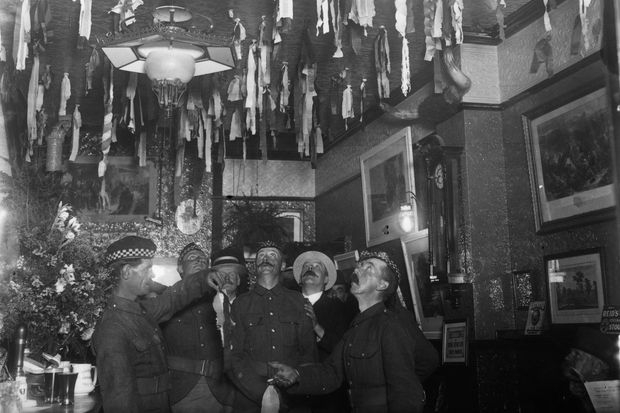From ‘The Racing Problem’, The Spectator, 20 March 1915:
We are not temperance fanatics. We do not suggest the prohibition of the public sate of intoxicants in order to penalize any one or to punish people for having sold alcohol in the past. We do not regard either the sale or the consumption of alcohol as a crime. A moderate consumption of alcohol does no more harm either morally or physically than a moderate indulgence in other unnecessary luxuries like smoking. We know, too, that a permanent temperance, a temperance worth having, can only come by a change in national habits—through freedom, not through interference with liberty. What we are asking for is merely war prohibition in order to produce national efficiency at the moment. After the war is over if people desire to use intoxicants they must be allowed to do so. In a word, our aim is strictly practical.
We see that at the moment public facilities for the purchase of liquor are interfering with the proper carrying on of the war, and therefore they must be stopped. Into the question of detail we cannot enter now, but we feel certain that, if prohibition were once decided upon, Parliament would have no difficulty in arriving at a just and wise settlement of details.
Only in one matter have we an observation to make as to ways and means. The public must not suppose that the sale of intoxicants need lead to the closing of all public-houses. On the contrary, we desire to see public-houses kept open for the sale of food and of non-intoxicants like mineral waters, beef-tea, cocoa, tea, coffee, &c. People will want refreshment just as much as now, and will be quite as willing to pay for it under the temporary prohibition as they now do. We are by no means sure, indeed, that, considering the tremendous taxation of alcohol, the public-house, run as a coffee-shop, might not make quite as good profits as it does now, or even better. But that does not matter. Even if we were to assume that public-houses would have no vogue as refreshment-houses, we should still say that it was better for every public-house in the country to perish than that we should endanger national efficiency. In order to get that concentration of effort which alone can win the war we must stop the waste of energy. The most obvious way of effecting this is to stop drinking and betting and the devotion of full working days to national picnics like Epsom and Ascot. If we cannot ensure this concentration of effort for a great purpose, then we are not fit to wage war. No sane person wants to stop reasonable recreation out of business hours. The trouble is that drinking and betting and racing come seriously into business hours. It has been well said that our motto should be not “Business as usual,” but “Business on an entirely unusual scale”–business speeded up by at least fifty per cent. But such speeding up cannot be attained without a great deal of sacrifice on the part of every class and every individual in the nation.






Comments